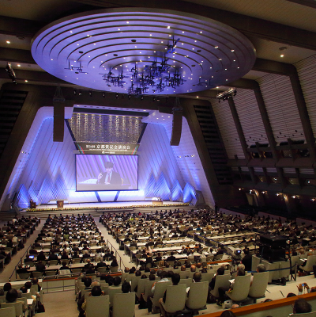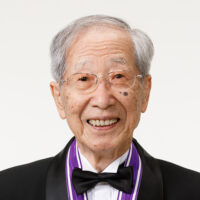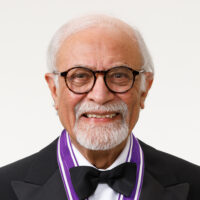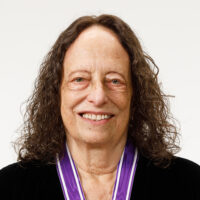The 2025 Kyoto Prize

Commemorative lectures by Kyoto Prize laureates are held in Kyoto. These lectures provide an opportunity to get to know not only the achievements of the laureates but also their views on life and personalities. The laureates, who have reached the pinnacles of their respective fields, talk about their research, art and life with various episodes. Please come and join us.
*Please note that we will not be accepting any on-site registrations on the day of the event.
2025
11 /11 Tue
13:00 - 16:10
Place: Kyoto International Conference Center
Capacity:1,500 persons (FCFS)
Languages:Simultaneous interpretation is provided.
Admission Free
The 2025 Kyoto Prize Kyoto Prize Laureates

Lecture topics
My Life Has Been Lucky!
Abstract of the lecture
I entered the University of Tokyo and proceeded to a newly established Mathematical Engineering course at the Faculty of Engineering, which accepted only five students. That was the beginning of my fortunate journey. In that course, the professors were passionately striving to explore their research fields in mathematical engineering toward new academic frontiers. Observing their great efforts, I learned the art of pursuing my own research freely without any constraint by conventional frameworks.
After earning a Ph.D., I started to contemplate the mechanisms of the brain and the nature of information at Kyushu University. At that time, I never imagined that my early study on machine learning there would in future lead to research connected to a Nobel Prize in Physics and grow into a major trend in artificial intelligence. The core of my research focused on artificial intelligence, mathematical neuroscience, and information geometry, all of which took ten or even twenty years until finally gaining worldwide recognition.
The greatest fortune in my life was being in such an environment to enjoy the freedom to fully immerse myself in unconstrained research driven solely by my own curiosity.

Lecture topics
From Africa to a Career in the Life Sciences
Abstract of the lecture
I was born in Kisumu, Kenya, a small town beside Lake Victoria, renowned for its stunning sunsets and home to hippos and vibrant cichlid fish. Inspired by my teacher, I became fascinated with living creatures, including malaria-spreading mosquitoes, but I had no role models to guide my future path. I travelled to the UK without a clear plan, attended two universities and spent time in Paris before arriving at Cambridge as a Ph.D. student under Robert Edwards, the pioneer of in vitro fertilization (IVF) babies. There, working on mammalian development was exhilarating, and I became curious whether mammals could develop without a paternal genome. Unexpectedly, I discovered that the paternal genome influences placental development, while the maternal genome favours fetal development; both are essential for normal development. These functional differences are not based on genetics, according to Mendel, but on reversible epigenetic imprints inherited from the parental germlines without alterations in the genetic code. This discovery marked the dawn of epigenetics research into mammalian development, evolution, and human diseases.

Lecture topics
The Audacity of Listening
Abstract of the lecture
The audacity of listening is a reflection on how by listening I came to recognize aspects of the world in which I was living that had previously been hidden, and to write about the different voice that I identified as an ethic of care. I will speak of hearing and then breaking the silence of women in conversations about morality. And I will recall the moment when I realized that listening becomes an audacious act when we rely on not knowing what we can learn when we listen for not just what people think but what they really think, and when they say what they actually feel and know rather than what they assume others want them to feel and think and know. It was listening to women and to girls that first brought this home to me. And now, with one foot in the arts and one in philosophy, I have written Solstice, a novel where I explore across three generations and several continents the questions: how do you know what’s true and how do you know what you can trust.
| 12:00 | Doors Open |
| 13:00 | Opening Opening Address Shinobu Inamori-Kanazawa(President of the Inamori Foundation) |
| 13:05 approx. | Kyoto Prize Commemorative Lecture in Advanced Technology Shun-ichi Amari “My Life Has Been Lucky!” |
| 14:00 approx. | Kyoto Prize Commemorative Lecture in Basic Sciences Azim Surani “From Africa to a Career in the Life Sciences” |
| Intermission | |
| 15:15 approx. | Kyoto Prize Commemorative Lecture in Arts and Philosophy Carol Gilligan “The Audacity of Listening” |
| 16:10 approx. | Closing |
*After each lecture, interviewer Mayuko Ishii (former NHK announcer / freelance) will ask the laureates about the lecture and their views on life from the audience’s perspective.
*Please note that the closing time of the lecture may change slightly depending on the progress of the event on the day.
Organized by Inamori Foundation
Supported by Kyoto Prefectural Government, Kyoto City Government, Kyoto Prefectural Board of Education, Kyoto City Board of Education, Kyoto Private High School Federation, The Consortium of Universities in Kyoto, Kyoto Chamber of Commerce and Industry, The Kyoto Shimbun, The Asahi Shimbun, The Mainichi Newspapers, The Yomiuri Shimbun, Nihon Keizai Shimbun, The Sankei Shimbun, Kyodo News, Jiji Press, NHK, Kyoto Broadcasting System, α-STATION FM KYOTO
Contact
Please direct all queries to the secretariat of the Kyoto Prize in Congrès Inc.
E-mail: kyoto-prize-lecture@congre.co.jp